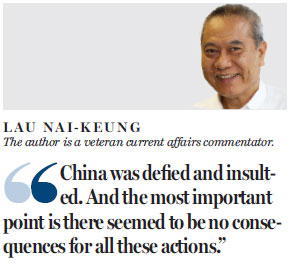Separatists' disrespect of the nation must be stopped
Updated: 2016-10-18 07:35
By Lau Nai-keung(HK Edition)
|
|||||||||
Lau Nai-keung argues that the separatists have declared 'war' on the SAR and all sensible Hong Kong people have to fight and win it because the stakes are simply too high
In the first meeting of the current Legislative Council session last Wednesday, where new lawmakers were required to recite a short oath before they can officially take their seats, incoming separatist lawmakers caused chaos by using their oaths to stage obnoxious anti-China protests.
Sixtus Leung Chung-hang and Yau Wai-ching began their oath by swearing allegiance to a "Hong Kong nation". They used profanities and pronounced China as "Shina", a now derogatory name used when the Japanese occupied the territory, and displayed a banner with the words "Hong Kong is not China".
These actions were intolerable.

As we all know, "Shina" is an archaic Japanese name for China. The word was originally used neutrally in both Chinese and Japanese, but came to be perceived as derogatory by the Chinese during the course of the Japanese invasion into China. As a result, it fell into disuse following the World War II and is now viewed as an offensive label by most Chinese.
According to the Basic Law, Hong Kong is part of China. If the separatists do not agree with this principle, why would they want to become a member of the Legislative Council, an institution that is part and parcel of the Hong Kong Special Administrative Region, whose jurisdiction is in turn derived from the Basic Law? Why shouldn't they just start a guerrilla war, many sensible observers will ask.
The answer lies in the fact that the separatists are well versed in Antonio Gramsci's concept of the "war of position". According to Gramsci, the Italian Marxist, the war of position is the struggle to gain positions of influence that can develop counter-hegemony for a social movement. A war of position is the slow, hidden conflict, where forces seek to gain influence and power.
Gramsci contrasts a "war of position" with a"war of maneuver", which is the phase of open conflict between classes, where the outcome is decided by direct clashes between revolutionaries and the state.
Gramsci, writing during his imprisonment by Italian fascist leader Benito Mussolini, sought to understand how it was that the Russian Revolution had succeeded and yet the European revolutionary movements had failed. He saw this as a result of a fundamental difference between Russia and the Central and Western European societies. "In the West, there was a proper relation between state and civil society, and when the state trembled a sturdy structure of civil society was at once revealed," he wrote.
Our dissidents glorify the civil society, but Gramsci saw it as a strong reactionary organ that legitimizes the state and capitalist society and therefore protected it from a socialist revolution. In other words, the state had hegemony, it had legitimacy, and the ruling class' vision of the world shaped people's consciousness, as the "common sense" of that society.
In our context, the "common sense" of our society is that Hong Kong is part of China. Before that common sense is altered, no amount of brute force can create an independent Hong Kong. In order to win, the separatist must subtly change our consciousness.
So far, the separatists are making progress. The oath-taking session was a successful attempt to challenge people's common sense. It was full of "bites", both visual and verbal. We saw a blue banner which looks like a flag, except it was not a flag of Hong Kong or the country that we usually see. China was defied and insulted. And the most important point is there seemed to be no consequences for all these actions.
Localism and the "Hong Kong independence" movement nobody had heard about these concepts a couple of years ago. Now they are everywhere. The fact that there are now separatists in our Legislative Council is itself not a cause, but the effect.
We have to understand that the war has already begun, and that this is a war that all sensible Hong Kong people must fight and win. This is a zero-sum game; either we win or we lose, and the stakes are high.
If the object of the war is to alter our society's common sense, we must reinforce it. Any attempt to challenge this common sense must be fought fiercely. Arise! It is our duty as Chinese nationals and as Hong Kong citizens to fight. And, most importantly, the government must lead this fight.
(HK Edition 10/18/2016 page7)